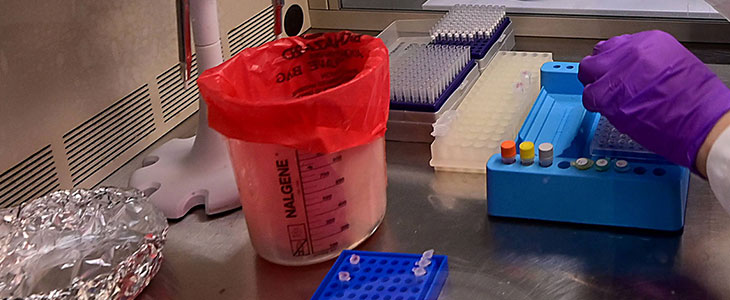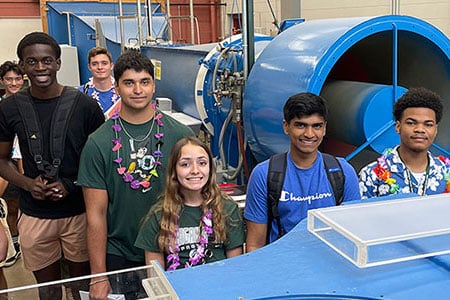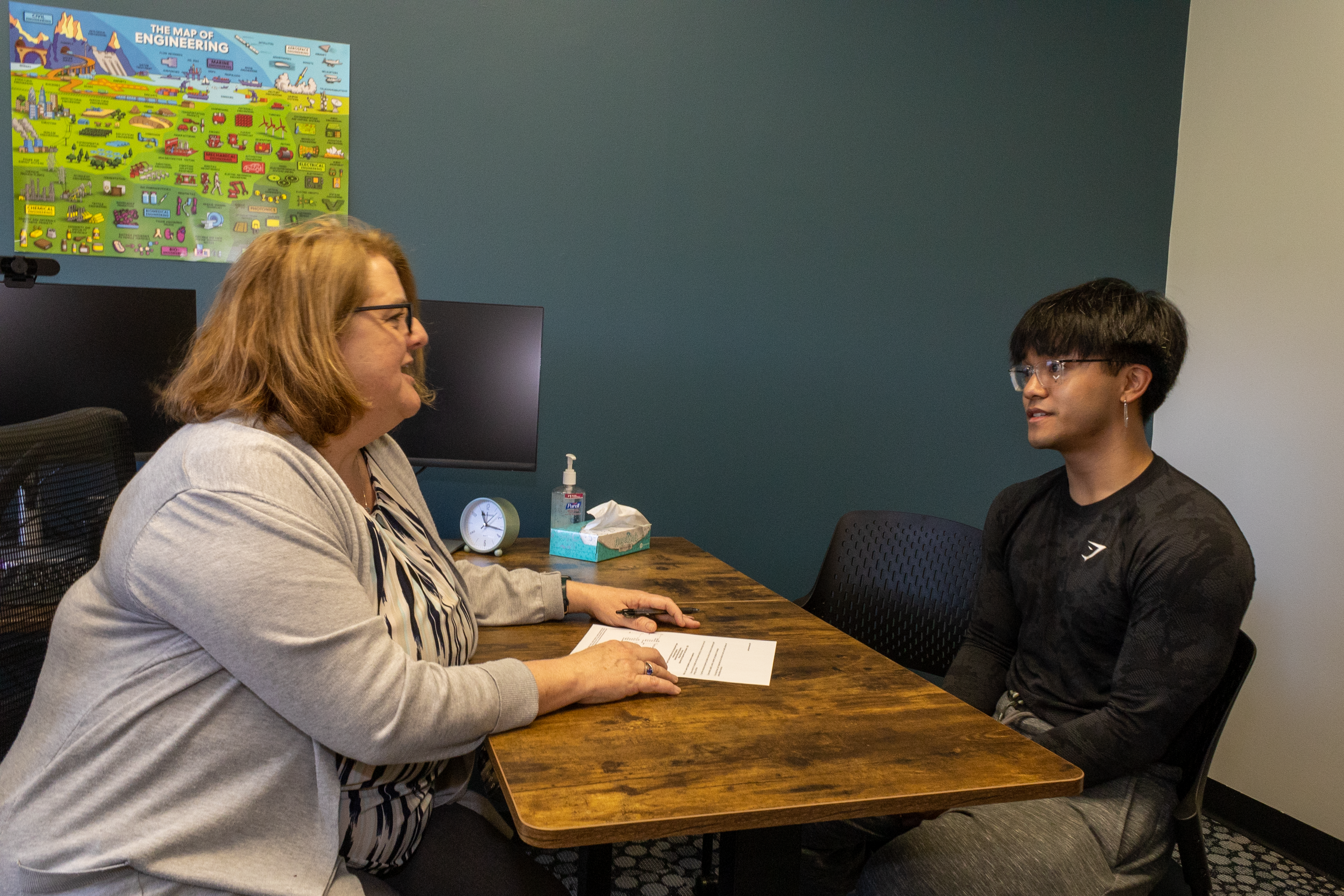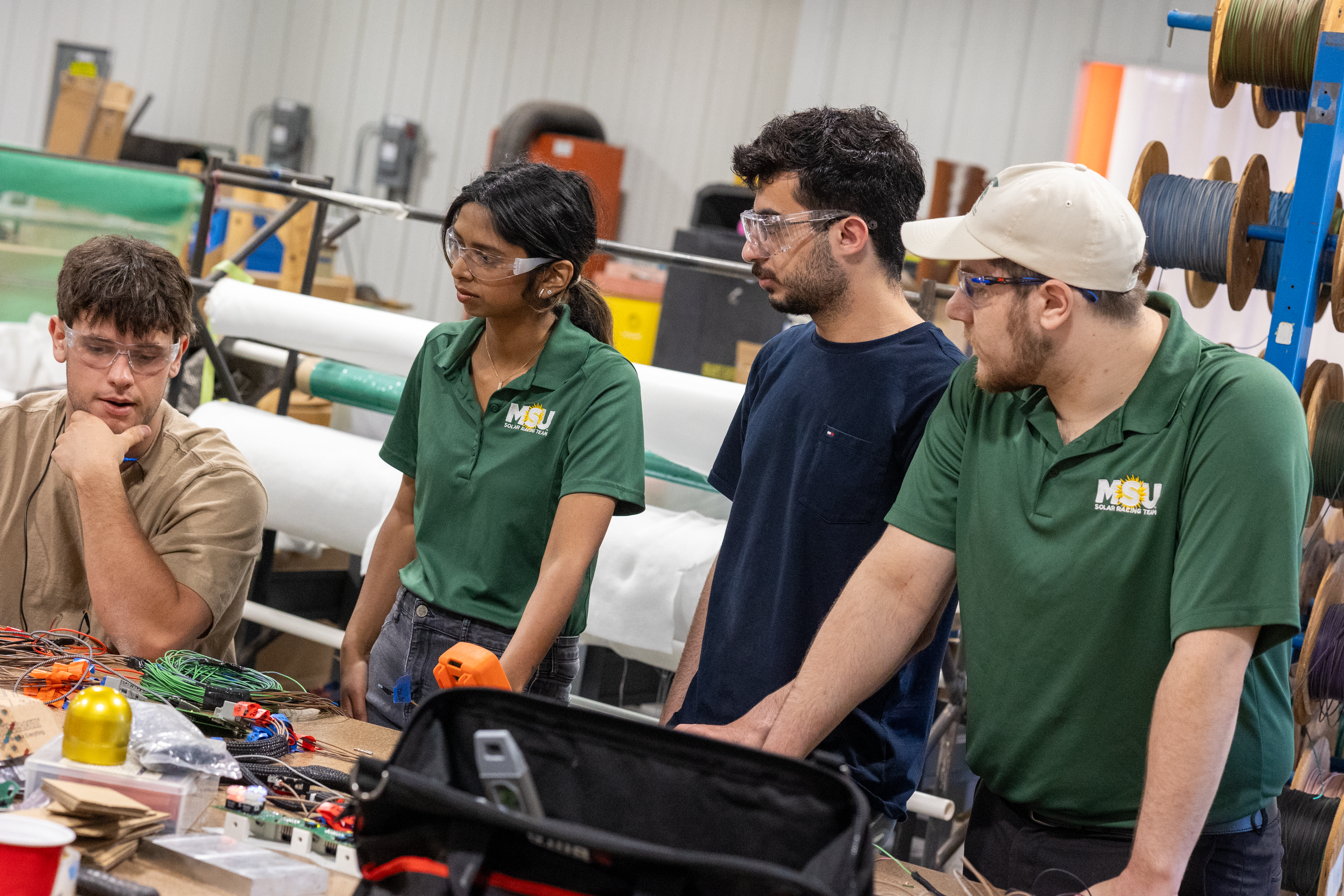
The Chemical Engineering and Materials Science and Engineering (CHEMS) department is pleased to offer continuing education for both CHEMS programs. The courses can be used to bolster expertise and/or bridge into a graduate program in the respective area.
Foundations in Chemical Engineering
ChE 804, ChE 805, ChE 806
Chemical engineering offers exciting job opportunities, and the profession is well-known for producing graduates having cross-disciplinary skills. The Michigan State University (MSU) Department of CHEMS is pleased to offer two specialty online courses that cover the key concepts from the chemical engineering undergraduate curriculum.
- Transcriptable Graduate Certificate Program: Collectively, the three courses CHE804, CHE805, and CHE806 constitute a transcriptable MSU Certificate Training Program that provides graduates from other science and engineering disciplines a broad overview of the foundational principles of a four-year chemical engineering curriculum. Students who earn a grade of 3.0/4.0 or higher in all three courses are awarded a Graduate Certificate in Foundations in Chemical Engineering, a designation that appears on their MSU transcript. The certificate program is also listed on MSU Online.
- The courses offer a "Bridging Program" into a chemical engineering M.S. or Ph.D. degree program for B.S. students with non-chemical engineering degrees. The courses provide sufficient background that students can enter and successfully complete graduate chemical engineering degrees. The courses are used by MSU and other chemical engineering departments as the core of a bridging program.
- Audit/Visitor Option: Students who desire a casual overview of chemical engineering principles may enroll in any of these bridging courses with audit/visitor status. Audit/Visitor students are not required to submit homework and quizzes and do not receive a course grade.
The courses provide professionals from other science and engineering disciplines an overview of fundamentals of chemical engineering principles. The three courses include most of the foundational principles covered in the four-year chemical engineering curriculum. Environmental engineers, chemists, biochemists, mechanical engineers, agricultural engineers, and food scientists are some of the professionals who have taken these courses to enhance their own technical backgrounds. A Certificate of Achievement in Foundations of Chemical Engineering is awarded to students earning a 3.0/4.0 or higher.
The courses offer a "Bridging Program" into a chemical engineering M.S. or Ph.D. degree program for B.S. students with non-chemical engineering degrees. The courses provide sufficient background that students can enter and successfully complete graduate chemical engineering degrees. The courses are used by MSU and other chemical engineering departments as the core of a bridging program.
MSU Students: Please view the enrollment information linked in "HOW TO ENROLL IN THE COURSES" (see the box above) to see if lifelong education status applies. STUDENTS TAKING THE COURSES FOR CREDIT/AUDIT ARE USUALLY LIFELONG EDUCATION STUDENTS UNLESS THEY ARE IN A MSU DEGREE PROGRAM. You do not need to be a Michigan resident for lifelong ed enrollment. In addition to tuition/enrollment, you should budget about $120-$130 per required textbook.
MSU tuition costs are available here. Each course is three credit hours.
CHE 804 Foundations in Chemical Engineering II (3 semester credits)
Mass and energy balances in batch, continuous and open systems. Process thermodynamics. Cryogenics. Properties of substances and mixtures. Phase equilibria. Chemical reaction equilibria. Chemical kinetics and reactor modeling. Process design orientation.
CHE 805 Foundations in Chemical Engineering II (3 Semester Credits)
Momentum, energy, and mass transfer. Laminar and turbulent flow. Fluid friction. Dimensional analysis. Heat transfer in stationary and flowing materials. Heat exchangers. Condensation. Boiling. Binary and multicomponent distillation, absorption, extraction.
CHE 806 Foundations in Chemical Engineering III (3 Semester Credits)
Process Dynamics, Linearization of Dynamics, Control Strategies, Controller Tuning, Process Economics, Process Design
OVERVIEW: Course outlines are available on the bridging program site. During the course, a calendar will clearly outline the timeline for lessons and homework. To assist you in the course, the instructor will be available by phone and by e-mail. The class web site will log Q&A, course materials etc. The class web site has capabilities for a chat room for students to chat with each other. A class list will be provided so that students can find out who else is enrolled. Space is provided in the class list for a brief personal bio and photo to help students find each other in the virtual classroom. The class web site is available only to students enrolled in the course.
The course preview page linked at the top of this pages gives the breakdown of the allocation of points for homework, quizzes, and the final exam.
LESSON DELIVERY: Lessons and example problems will be provided using QuickTime movies. Each lesson uses a handout that you download prior to viewing the lecture. Each topic module will have related homework problems to help you strengthen your understanding.
QUIZZES AND FINAL EXAM: You will need to arrange to take biweekly 1-hour timed quizzes (open book), and a final exam in proctored situations. An office supervisor can serve as a proctor, or a local librarian has sometimes been used or another lifelong ed office at a local school could be used. The quizzes will be FAXED to the proctor, and you will take the quizzes there. The proctor will FAX the quiz/exam back to us. The proctor will need to complete the proctor agreement form available on the enrollment web page.
HOMEWORK: This is typically most easily done by hand, and can be FAXED or scanned and emailed or uploaded to us. Typically, we will FAX it back. Approximately 45 homework problems will be worked in the course.
RIGOR OF MATERIAL: Foundations in Chemical Engineering I and II combine concepts from several undergraduate courses, and move at a pace faster than the courses that they replace. Standard undergraduate textbooks are used. The quizzes/exams are of the same rigor that would be given in undergraduate courses covering the same material. Students enrolled for credit should expect to spend a minimum of 10 hours per week on each course, and it is not unusual to spend 12-15 hours/week. Students interested in a superficial survey of concepts should enroll as C/NC or audit (visitor) status rather than a graded credit option.
Technical Requirements for This Course
Hardware and Software Requirements
- This course requires the Minimum Technical Requirements. Review MSU hardware and software minimum requirements on Technology at MSU.
Other Tools and Skills Needed to Complete This Course
To take ChE 804/805/806 online, you'll need to have access to the following. Go through each item in this list before you take this class, to be sure your system is set up correctly.
- Install Acrobat Reader (free)
- Setup MSU NetID and mail for log-in capability (The links can update, so look on this page for the link to set up your MSU email. It is critical to set up your MSU email to receive communications from MSU.)
Navigation for This Course
The courses are delivered using the Desire to Learn (D2L) course system. To understand the course system, view the D2L overview.
Where to Find Your Class
Once you complete the steps on this page, you are ready to attend your class. The web address for ChE 804/805 is the D2L website.
You will be presented with a list of classes for which you are enrolled. You will be unable to access the course pages until the first day of class. The course may display on the list of courses prior to the first day of class. If the course shows on your D2L screen you are enrolled. If you are unable to view the course on the first day of class, contact the instructor immediately.
There is no formal "application" process or screening of enrollment but deficiency of a prerequisite will require greater student time commitment. If you have questions about the suitability of your background, contact one of the professors for the courses:
CHE 804 - Professor Carl Lira, lira@egr.msu.edu, (517) 355-9731
CHE 805 - Professor Mark Worden, worden@egr.msu.edu, (517) 353-9015
CHE 806 - Contact either Professor Lira or Professor Worden
Lifelong Ed students should enroll at least two weeks before the start date of a course. Certificate students should be applying at least six weeks before the start date of a course. You will want to have time to order textbooks and set up your computer and email. Please see the information on enrollment and course setup.
After enrolling, be sure to proceed with ordering textbooks and computer setup.
Collectively, the three courses provide an overview of the following MSU undergraduate courses that represent the foundations of technical content of chemical engineering:
- Material and Energy Balances (ChE 804)
- Thermodynamics for Chemical Engineering (ChE 804)
- Chemical Reaction Engineering (ChE 804)
- Fluid Flow and Heat Transfer (ChE 805)
- Mass Transfer and Separations (ChE 805)
- Principles of Process Control and Dynamics (ChE 806)
- Chemical Process Design and Optimization (ChE 806)
Students completing these courses should understand foundational chemical engineering principles and be able to apply those principles by performing common chemical engineering calculations covered in undergraduate chemical engineering programs.
Spring 2023
I want to write this email to express my personal appreciation for your teaching on this course. I did notice that you have replied to my questions at late night several times in the past few months.
The way you teach in Unit I and Unit II is very helpful for someone like me who wants to improve his/her ability to model or understand the models for chemical engineering processes. I feel like I can build some models now immediately for some of the processes I have been interested in for a long time. Greatly appreciated.
The biggest benefit I have received from this class in Unit III is the methodology of using reaction coordinate to link all the components with the limiting reactant. In the past, I always counted moles for polymerization reactions and confused myself almost all the time in reaction kinetics especially when the reaction involves multiple reactants of different functionality and nonequal moles. The reactor design part is amazing. I may already have many of the concepts in the past; however, this is the first time I learnt how these concepts are dealt with mathematically, and even brought some aspects that are new to me. Dr. Lira, you may consider writing Unit III in your "Introductory" book in the future, I do like to read Elliott and Lira book better than the Levenspiel book.
I am a professional chemist working in the United States for over 20 years also has experience as a teacher in a Chinese university long long time ago. This is the first time I have completed a class in a university in the United States and I am proud that I am survived from the class. As an additional benefit from your class, I learnt a different teaching philosophy. If the class had extended time, I would try to complete all the problems in each chapter in these textbooks and I will try to do it in my next class Chem 805.
Ning Luo
Spring 2018
I would just like to thank you for an amazing spring semester and all of the extensions, help, and clarifications you provided over the course of four months--you really are amazing at what you do:
I realized just how lucky I was to have found your program when I found myself teaching thermo to a few friends at school before their finals! I truly learned a lot and I humbly thank you for providing such an amazing opportunity for those who really want to learn despite a busy and hectic life.
I wish you luck in the future and hope that you continue to provide such an opportunity!
Poorva Patel
Spring/Summer 2016 (Received Spring 2018)
Foundations of Chemical Engineering program advanced my career in pharmaceutical manufacturing. Completing a B.S. in Biotechnology and immediately working for a large pharmaceutical company, I consistently felt that I was behind my peers with a chemical engineering background. Michigan State's program closed this gap, introducing concepts that were applicable in my day-to-day operations. Although challenging and comprehensive, I was able to complete the program while concurrently working full-time. Both Professor Lira and Worden were easily accessible, and answered my questions promptly.
Moving forward in my career, I will be attending Northeastern University's chemical engineering PhD program. Completion of the Foundations of CE program played an integral role in my PhD application. I strongly recommend this program for anyone interested in chemical engineering!
- Zach Rogers
Spring Summer 2012 (Received Spring 2016)
Working as a chemical operator with a B.S. in Biology, I had little hope of advancement in an industry where those advancements were dominated by engineers. After some research, I enrolled and completed MSUs Bridging Program in the Spring/Summer of 2012. I spent the Fall semester of 2012 completing additional mathematics courses, since my undergraduate coursework did not require the same rigor of mathematics that admittance to a MSCHE program required. During that same period, I applied for multiple distance MSCHE programs that would allow me to continue working while obtaining a masters degree in engineering. I then spent 3 years completing my MSCHE at North Carolina State University part time, graduating December 2015.
A few quick thoughts and appreciation: My entry into a program as respected and highly ranked as NCSUs MSCHE program would not have been possible without the effort that Drl Lira and Dr. Worden have put into the rigor of MSUs unique bridging program. My advancements into process engineering and senior technical staff are a direct result of your program and the effort provided outside of the material for the course (i.e. various email correspondence, online collaboration, etc.) by Dr. Lira and Dr. Worden. Finally, as stated by other testimonials, distance studies have their unique challenges. However, I never received the amount of help in my MSCHE that I did while enrolled in the MSU program.
I routinely utilize my textbooks from the bridging program, and I'm thoroughly thrilled with both my education and career progress over these past few years. I'm excited about the opportunities, and look forward to where I'll go next! I've had multiple individuals reach out to me due to my unconventional background for chemical engineering, and I always tout your program with the highest praise.
- Jeremiah Patton
Spring/Summer 2005 student (Received Spring 2009)
You may not remember me, but I took your bridging courses in the spring and summer of 2005. I just finished my masters degree, along with another student I met in your courses. I just wanted to say thank you for the time and effort you put into the bridging program. I felt very well prepared for the challenges of learning a new subject at the graduate level. The course presentation and content in your courses was top notch. After finishing all my masters classes I realize how out-of-the-ordinary the one-on-one contact and class chats were. I think I had more professorial access time in one chat session at MSU than in all the rest of my graduate education. Thank you both so much and good luck in your future endeavors.
- Luke Johnson, Environmental Engineer, Roche Colorado
Spring 2003 Student
I really enjoyed taking the class. I am sure it takes a lot of time on your part. I was surprised to find that I had as much or more interaction with you than my college professors when I was in school full time. I appreciate you and MSU making this course available over the internet. LSU does not offer a course such as this one, or even standard undergraduate courses at night. Until I found out about this course, I could not formally study Chemical Engineering.
- Gilbert Kelly, BS (1990 Chemistry)
Fall 2001 Student
I just wanted to let you know that I enjoyed the course. I think I have gotten what I wanted from it. I spent a lot of time reading and actually trying to 'get' the lessons which I think I did for the most part. I am really very pleased about that. I have really learned a whole lot.
- Robertha Howell BSc (1993, Chemistry), Ph.D. (1997, Chemistry)
Fall 2000 Student
I think it is wonderful - recording the live chats was a tremendous help for me. Being in a different time zone made it hard for me to participate in the live chats and it was great to see the conversation after it took place! Several of my questions were answered this way. I found it helpful to know what my peers were thinking and doing in relation to the course material.
Response to anonymous survey.
1999 Students
As a B.S. Chemistry/BioChemistry undergraduate student, I was very grateful to find the "bridging" courses ChE804 and ChE805 to help me make the adjustment in a graduate Chemical Engineering program (Univ Tenn, Knoxville). Although the material was covered in a brief amount of time (Summer Semester), I applied myself that summer and did very well in my first Advanced ChE Thermo Course (got an 'A') in Graduate School. I am now halfway finished with my M.S. ChE degree and have a great appreciation for the 'bridging courses'. I am sure others will find a need for the courses just as I did. Thanks!!
Seth C. Galloway, Aug 9, 2000
B.S. Biochemistry/Chemistry 1991
I had taken the courses to see how chemical engineering suits me as a profession and in retrospect, I think I got fair idea of the profession. I think the course material was comprehensive. Sometimes I thought that the coverage on some topics was not enough but keeping in mind length of course, I think planners had done good job. The homework was challenging. Taking these courses was a lot better than taking all those undergrad courses. It especially gives the student a feel for relevant topics much more efficiently than self-study. I am currently pursuing Dual Ph.D. in Chemical Engineering/Chemistry at MSU.
Parminder Agarwal, Aug 9, 2000
B.S. Chemistry, M.S. Chemistry, M.S. Polymer Engineering
1986 Student
After my junior year as a chemistry major at Central Michigan University (CMU), I decided to become a chemical engineer. Fortunately, I met the MSU Dean of Engineering and he suggested completing my B.S. in chemistry at CMU and then entering the MSU bridging program after graduation. The bridging courses allowed me to cut one year off achieving my M.S. in Chemical Engineering. Those of us taking the bridging course in the summer of 1986 found it challenging and rewarding. However, since we took this course B.A.C. (before air conditioning), we will always remember the true meaning of sweating through an exam!
Craig Hoekstra , Aug 9, 2000
Class of 1988 M.S. ChE (MSU)
Project Manager Pharmacia Corp.
Letters from Students
1986 student
Letter from Andrew Grethlein, Ph.D.
Associate Director, Biopharmaceuticals
Athena Neuroscience
Dr. R. Mark Worden
Associate Professor
Department of Chemical Engineering
Michigan State University
East Lansing, MI, 48824-1226
Dear Mark:
Please find the below a letter of support for the ChE bridging courses offered by the department. As you know, this program was one of the main reasons I came to MSU back in 1986 to begin graduate studies, and it was an important step in my education as well as a turning point in my career development.
I enrolled in the bridging program holding a B.S. in biology and an interest in biotechnology, specifically fermentation and cell culture. To me, the chemical engineering curriculum, which was available via the bridging program, was the best and most effective strategy in preparation for a career in industry, As I had learned and as I still se today, this industry often requires multi-disciplinary training and flexibility between many different fields. The bridging program offered a route towards developing such a background.
The program itself was definitely a challenge. Problem solving was paramount to hone mathematical and analytical skills not often fully developed in other disciplines but required for chemical engineering. The thermodynamics, traditional industrial unit operations, and reaction engineering, with mathematics and calculus bridging all four areas. I remember it to be intensive but well structured towards the participants, and by the time it was complete the students had the basic skills and confidence to enter the graduate program and actively participate. One key point I remember is that during the graduate program I often referred to mu bridging course notes and papers and found them quite valuable as a reference. This was particularly true as I prepared for my Ph.D. qualifying examinations.
Since graduating from MSU I have worked as a biochemical engineer in a laboratory/pilot-plant setting conducting fermentation and purification development work, I have been employed as a manufacturing manager in producing a clinical biopharmaceutical and I find myself ow working as both a project manager and a manufacturing director. My responsibilities and roles are currently very broad and include bioprocess development and qualification, facility design and construction, equipment specification and validation, and product manufacturing. In retrospect, the multi-disciplinary training that the bridging program provides has become hallmark of my professional development and has allowed me to take advantage of opportunities and challenges that may not have been accessible otherwise.
Sincerely,
Andrew J. Grethjeim, Ph.D.
Associate Director, Biopharmaceuticals
Foundations in Materials Science and Engineering
MSE 801
Note: MSE 801 will not be offered in the Summer 2025 semester. Please check back in Summer 2026 for further updates.
Materials Science and Engineering offers exciting job opportunities, and the profession is well-known for producing graduates having cross-disciplinary skills. The Michigan State University (MSU) Department of CHEMS is pleased to offer one specialty course via the Internet that covers the key concepts from the materials science and engineering undergraduate curriculum. This course can be used as a certificate or bridging program.
This course provides professionals from other science and engineering disciplines an overview of fundamentals of materials science and engineering principles.
This course provides an overview of the following topics that represent the foundations of technical content of materials science and engineering:
- Chemical Bonding
- Phase Diagrams
- Mechanical Behavior
- Crystallography
- Basic Similarities and Differences between Metals, Ceramics, Polymers and Composites
This course covers enough of the core material that students are able to perform routine calculations and advance into a graduate materials science and engineering program.
This course offers a "Bridging Program" into a materials science and engineering M.S. or Ph.D. degree program for B.S. students with non-materials science and engineering degrees. This course provides sufficient background that students can enter and successfully complete graduate materials science and engineering degrees. This course is used by MSU as the core of a bridging program.
Some details provided are intended for students specifically interested in enrolling at MSU. If you are interested in using this course as a bridge program to graduate program at another institution, you may wish to speak with that institution's materials science and engineering graduate admissions adviser about how this course might fit with your career plans.
MSE 801 Foundations in Materials Science and Engineering (3 Semester Credits)
Chemical Bonding of Atoms, Mechanical Behavior of Material. Diffusion. Crystallography. Properties of Materials. Phase diagrams and phase equilibria. The basic similarities and differences of metals, ceramics, polymers and composite materials.
OVERVIEW: Course outlines are available on the bridging program site. During the course, a calendar will clearly outline the timeline for lessons and homework. To assist you in the course, the instructor will be available by phone and by email The class website will log Q&A, course materials etc. The class website has capabilities for a chat room for students to chat with each other. A class list will be provided so that students can find out who else is enrolled. Space is provided in the class list for a brief personal bio and photo to help students find each other in the virtual classroom. The class website is available only to students enrolled in the course.
The course preview page linked at the top of this pages gives the breakdown of the allocation of points for homework, quizzes, and the final exam.
LESSON DELIVERY: Lessons and example problems will be provided using QuickTime movies. Each lesson uses a handout that you download prior to viewing the lecture. Each topic module will have related homework problems to help you strengthen your understanding.
QUIZZES AND FINAL EXAM: You will need to arrange to take biweekly 1-hour timed quizzes (open book), and a final exam in proctored situations. An office supervisor can serve as a proctor, or a local librarian has sometimes been used or another lifelong ed office at a local school could be used. The quizzes will be FAXED to the proctor, and you will take the quizzes there. The proctor will FAX the quiz/exam back to us. The proctor will need to complete the proctor agreement form available on the enrollment web page.
HOMEWORK: This is typically most easily done by hand, and can be FAXED or scanned and emailed or uploaded to us. Typically, we will FAX it back. Approximately 45 homework problems will be worked in the course.
RIGOR OF MATERIAL: Foundations in Chemical Engineering I and II combine concepts from several undergraduate courses, and move at a pace faster than the courses they replace. Standard undergraduate textbooks are used. The quizzes/exams are of the same rigor that would be given in undergraduate courses covering the same material. Students enrolled for credit should expect to spend a minimum of 10 hours per week on each course, and it is not unusual to spend 12-15 hours/week. Students interested in a superficial survey of concepts should enroll as C/NC or audit (visitor) status rather than a graded credit option.
There are no prerequisites for this course. Please review the "course mechanics" link in the section titled "How to Take the Courses" immediately below. The course mechanics section discusses instructor expectations for student time commitment. There is no formal "application" process or screening of enrollment. If you have questions about the suitability of your background, contact Professor Carl Boehlert, boehlert@egr.msu.edu, (517) 353-3703.
MSU Students: Please view the enrollment information linked in "HOW TO ENROLL IN THE COURSES" (see the box above) to see if lifelong education status applies. STUDENTS TAKING THIS COURSE FOR CREDIT/AUDIT ARE USUALLY LIFELONG EDUCATION STUDENTS UNLESS THEY ARE IN A MSU DEGREE PROGRAM. You do not need to be a Michigan resident for lifelong ed enrollment. In addition to tuition/enrollment, you should budget about $120-$130 per required textbook.
MSU tuition costs are available here. The course is three credit hours.
Interested in a graduate degree in Chemical Engineering or Materials Science and Engineering?





